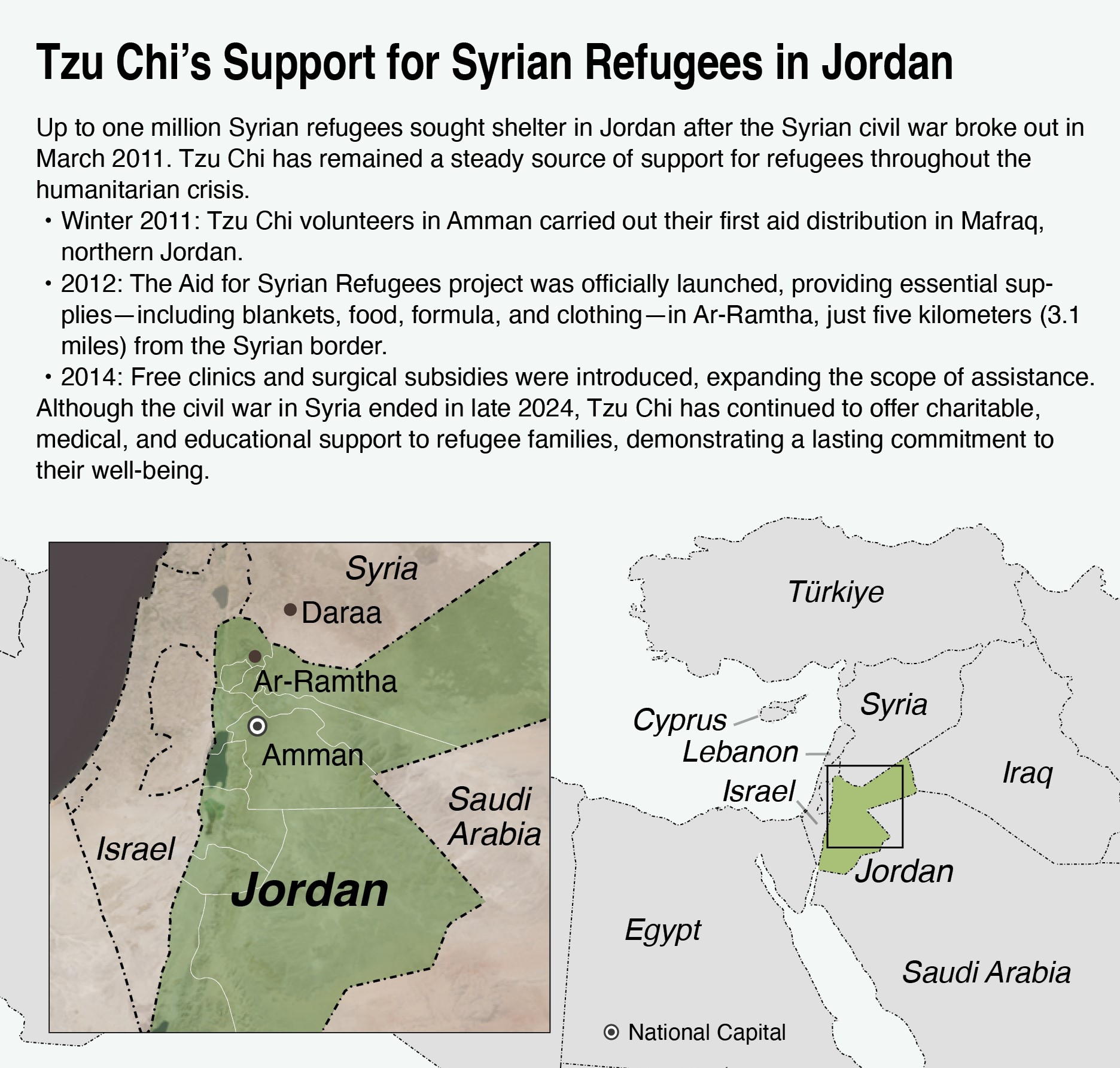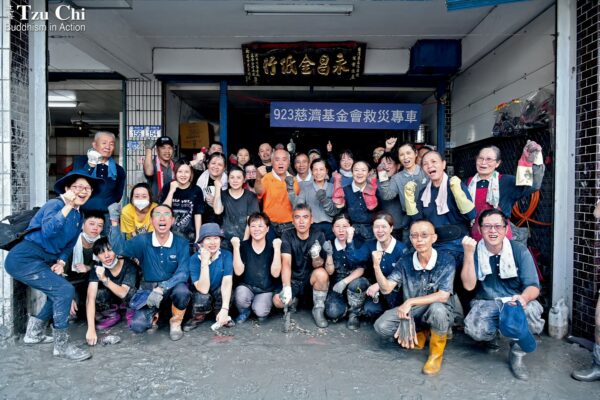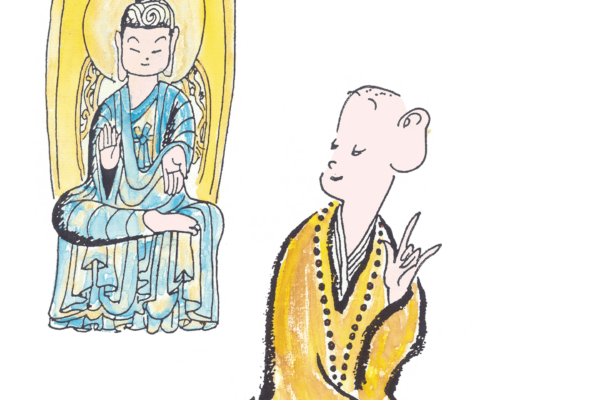Text and photo by Lamiya Lin
Translated by Wu Hsiao-ting
Though Ar-Ramtha, in northern Jordan, is just a 30-minute drive from Daraa, Syria, Ismahan Al Masri had waited over a decade to return. She kept the grief of losing her son buried deep within, carried the beauty she had found in a foreign land, and returned to Syria with a mission.
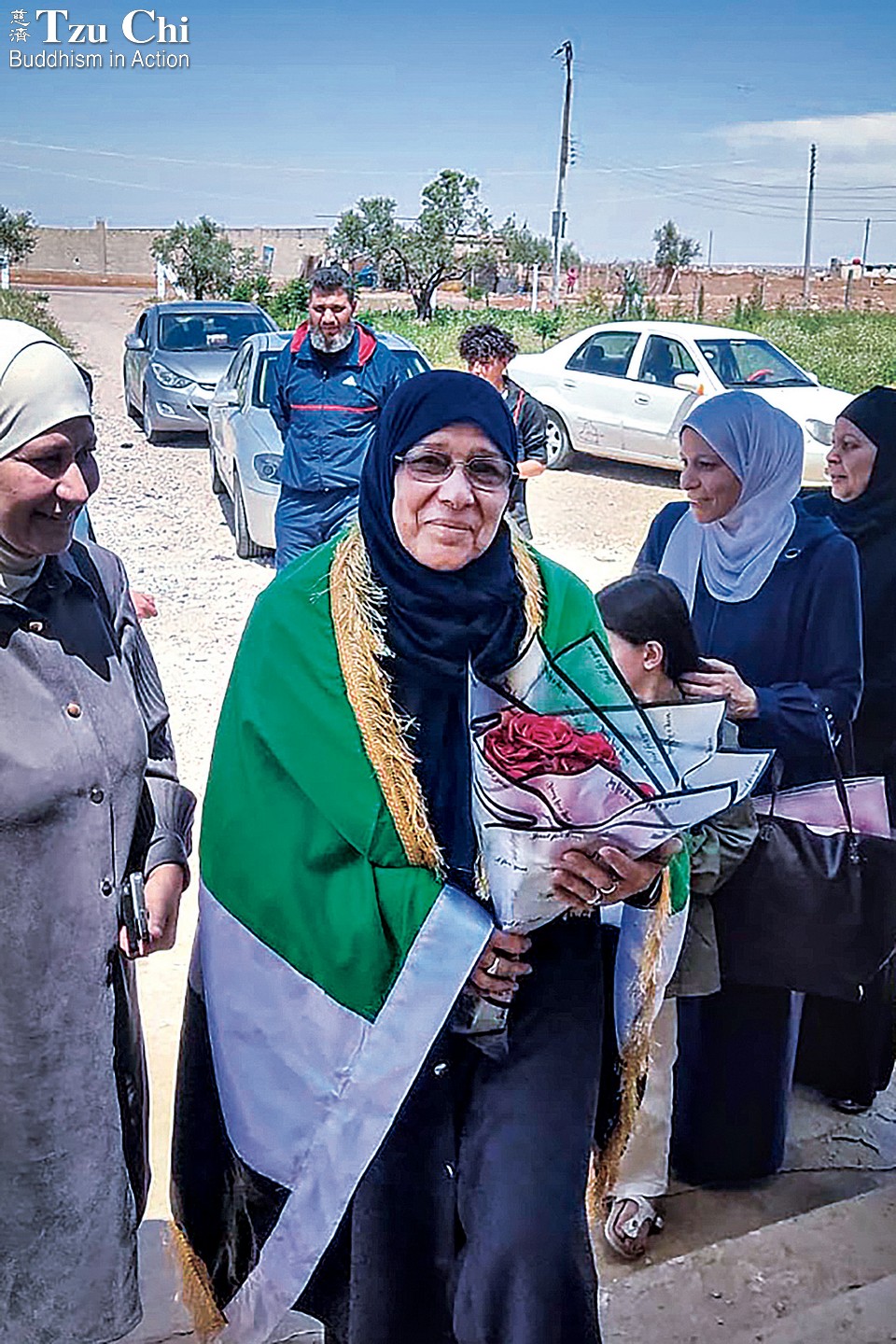
Ismahan and her family are welcomed home by their extended family upon returning to Syria. Courtesy of Ismahan Al Masri
“
We packed all the beautiful things given to us during our time in exile—gifts from friends, from our dear family, and from the compassionate Master Cheng Yen herself,” said 62-year-old Ismahan Al Masri, gazing at the belongings that filled a truck. Though the future of her war-scarred homeland remained uncertain, she looked forward to going back to Syria without fear, bringing all the love she had received in a foreign land with her.
The 13-year Syrian civil war ended on December 8, 2024, bringing a long-awaited glimmer of hope to more than ten million people displaced by the conflict. On April 19, 2025, Ismahan’s family joined the growing number of returnees. Eight family members spanning four generations departed from Ar-Ramtha, a northern border city in Jordan, and headed for Daraa in southern Syria. The group included Ismahan, her husband, Mousa, her elderly parents, her daughter-in-law, and her grandchildren.
Tzu Chi volunteers in Jordan, holding back their emotions, accompanied the family to the Jaber border crossing. “The first thing I want to do when I get home is visit my son’s grave,” said Ismahan. “I want to see my son.”
A better next chapter
The war started on March 18, 2011. Ismahan and her husband fled to Ar-Ramtha with their family in late 2012. Their eldest son, Ali, later returned to Syria to take up arms. Sadly, he was killed in battle on September 28, 2013. “That day, my heart was buried with him,” Ismahan said. Her grief was immeasurable.
As waves of displaced Syrian families poured into Jordan after the war erupted, Tzu Chi launched relief efforts to support the refugees, providing essentials, education assistance, medical aid, and winter fuel subsidies. In 2016, Chen Chiou Hwa (陳秋華), head of Tzu Chi Jordan, and other volunteers knocked on Ismahan’s door, bringing love with them. They offered not only long-term material support but also a path toward healing.
A gifted writer like her father, Musa Al Masri, Ismahan channeled her gratitude for Master Cheng Yen and the volunteers into poetry and prose. Her writing became not only a way for her to heal, but also a source of comfort and inspiration for other refugee mothers coping with grief.
Then came another trial: a severe bout of COVID-19. Tzu Chi provided her with an oxygen concentrator and medication, helping her recover. Her gratitude for the foundation only deepened.
Together with fellow Syrian Elham Aljawabra, Ismahan trained as a Tzu Chi volunteer and assisted with free clinics and winter aid distributions for refugees in Ar-Ramtha. But through it all, her heart remained in Syria, with her son Ali. When the war finally ended, her thoughts turned homeward.
Early on the morning of the day the family was set to depart, Elham, Jordanian Tzu Chi volunteers Khader Khalifeh and Lamiya Lin (林綠卿), and Syrian volunteer Mohamed Khir Alriz rushed from Amman to Ar-Ramtha to see them off, cherishing this final moment together before the family’s long-awaited return.
“Thank Allah, today we’re going home,” said Ismahan. “I know we might be surprised or even shocked when we arrive, but I believe we’ll also find joy.” She was apprehensive yet hopeful. Much had been lost, but she still held on to hope for the future: “We’ve already endured so much. I’m looking forward to a better next chapter.”
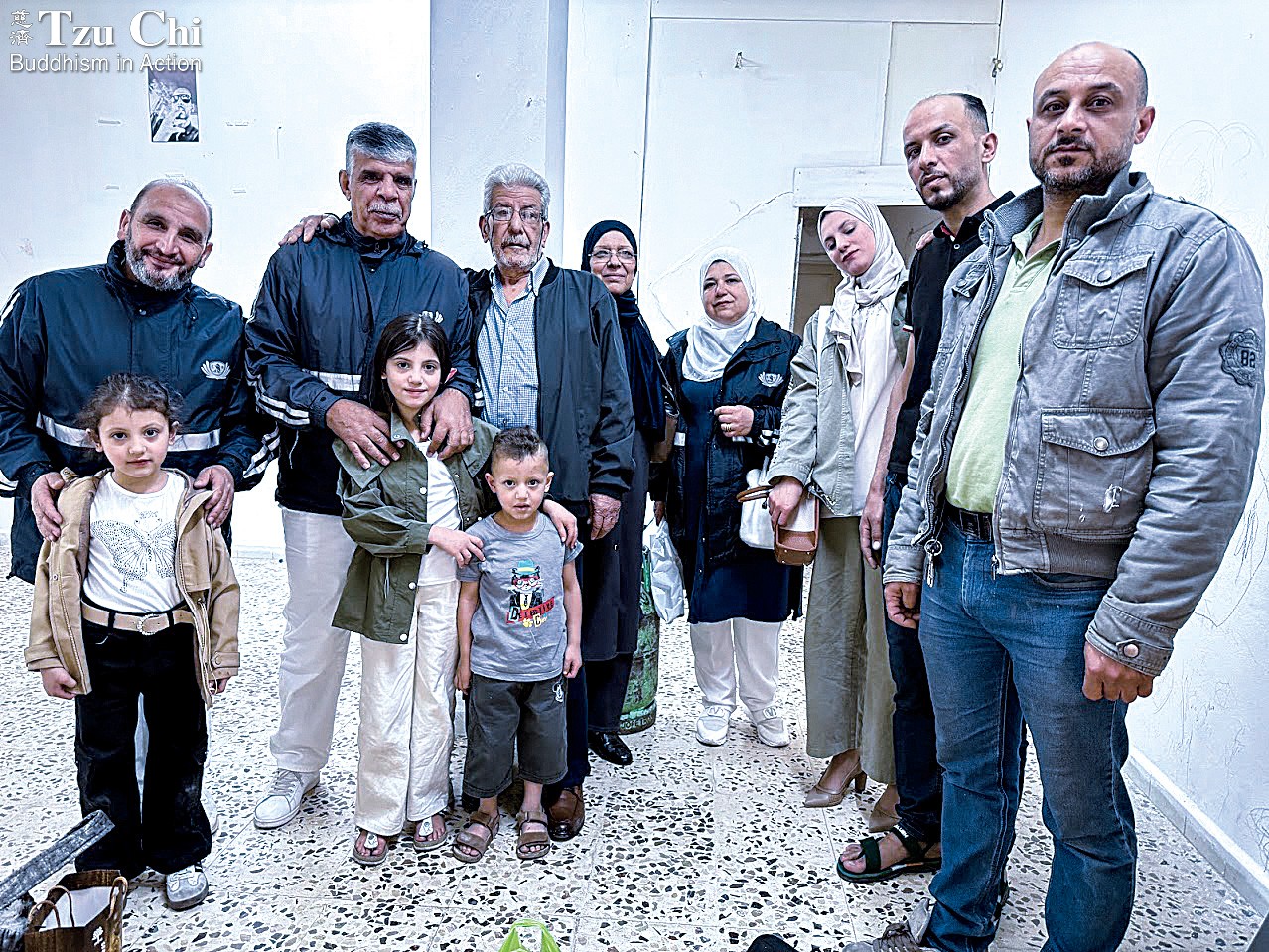
Tzu Chi volunteers gather with Ismahan and her family on the day of their return to Syria.
Following the Master’s teachings
As they prepared to return home, everyone busied themselves loading furniture and daily essentials onto a large truck, which now held more than ten years’ worth of belongings and memories. Before long, Ismahan’s once warm and cozy home stood empty. She felt a swirl of emotions—sadness, gratitude, anticipation—but she knew the time had come. No matter where life took her, she would continue to follow Master Cheng Yen’s teachings, letting love guide her way. “Dear Compassionate Master,” said Ismahan, “we will bring your teachings back to our country. We will be your hands to help suffering people in Syria, just as you have helped us.”
Volunteer Khader struck up a conversation with the truck driver and learned that he had traveled between Ar-Ramtha and Daraa many times since the war had ended, helping Syrians return home. Ar-Ramtha is only a 30-minute drive from Daraa, but for the returning families, the journey marked the fulfillment of years of longing.
When everything was ready, the truck slowly pulled away, followed closely by the volunteers in their cars. Supplies were limited in post-war Syria, and the economic situation was dire. One Jordanian dinar, for instance, was worth about 15,000 Syrian lira. Given this reality, the family brought as much as they could: drinking water, bread, sugar, and other essentials. Even a refrigerator and gas stove were strapped to the roof of the truck. Ismahan’s younger son, 33-year-old Mohammad, planned to stay behind in Jordan for another month to work and pay off debts. He packed a large bag of bread for his mother to take home.
The group made a quick stop at Ismahan’s parents’ house to pick them up. Ismahan’s 87-year-old father, Musa, was blind. She gently whispered to him, “Tzu Chi volunteers are here to see us off.” At these words, Musa burst into tears. Over the years in Jordan, Tzu Chi had helped cover their rent and medical bills, and monthly visits from volunteers had eased their loneliness. The bond that had formed between them was like that of a family. Out of gratitude, Musa said again and again to the volunteers, “May Allah bless you all with good luck and keep you healthy and safe.” His words moved everyone to tears.
Ismahan holds plump bean pods in her hand at her brother’s home, wearing a gentle smile that reflects her hope for the future. Courtesy of Ismahan Al Masri
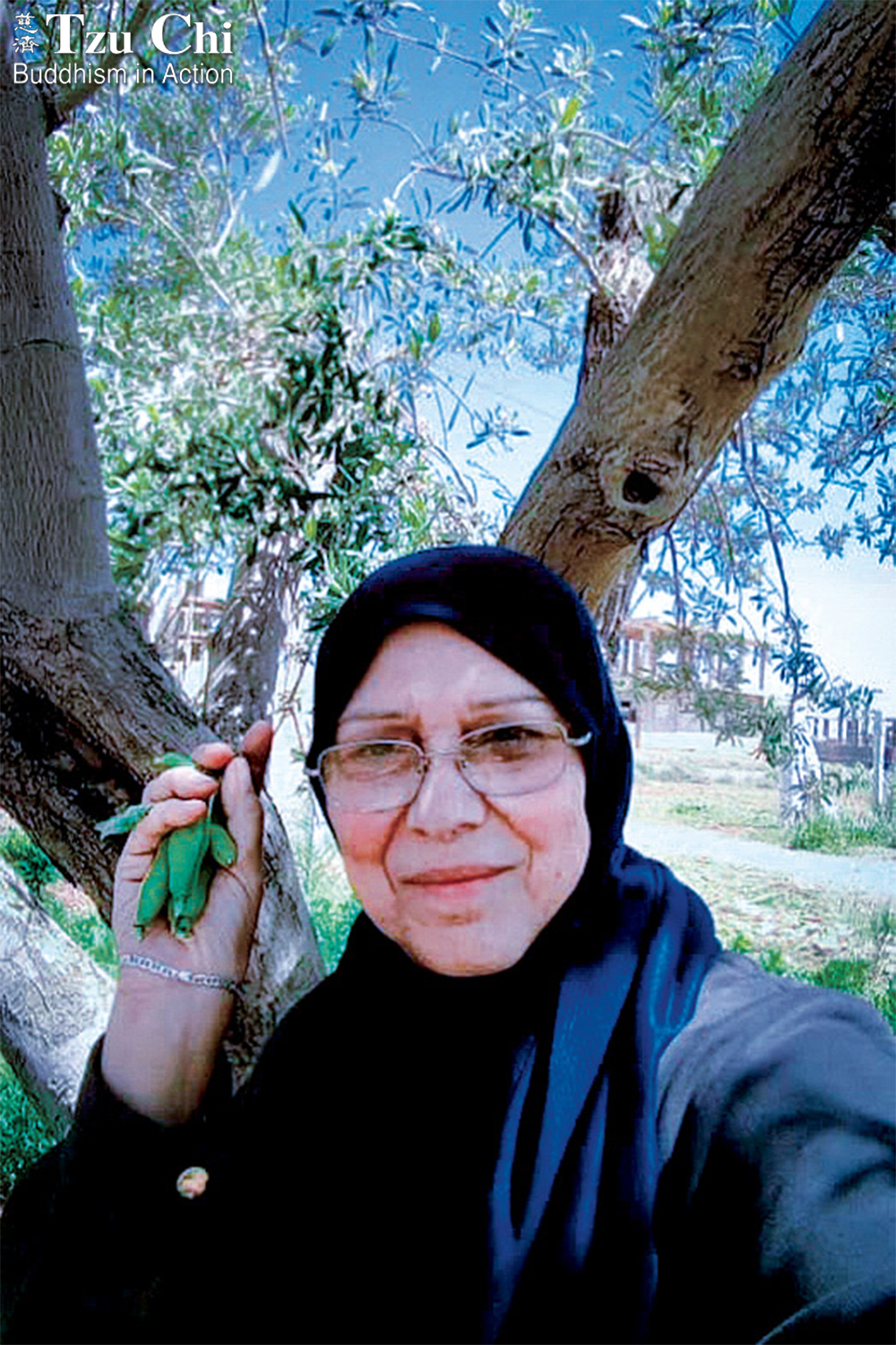
In Tzu Chi’s name
As Jordan’s National Day on May 25 approached, the streets were decked with fluttering Jordanian flags. Ismahan’s heart was full of gratitude for the country that had given her family—and so many other Syrians—sanctuary and humanitarian aid.
Elham was happy to see the family off, but she couldn’t help voicing her concerns: “My brother and his family returned to Syria ten days ago. Life there isn’t easy. He already regrets leaving Jordan. The situation is still unstable; there was even an explosion on the very day they arrived.”
She explained that their hometown had no reliable electricity or running water—just an hour and a half of electricity each day. The war’s destruction was visible everywhere, and jobs were scarce. With no basic infrastructure and no essential systems in place, Elham had decided to stay in Jordan a while longer.
When the group reached the Jaber border crossing, Mohammad stepped out to present his family’s refugee documents and process their exit paperwork. Volunteer Mohamed, himself a Syrian refugee, stood nearby, overcome with conflicting emotions. “Today is both joyful and sorrowful,” he said. “Joyful, because they’re finally returning home. Sorrowful, because we don’t know when we’ll meet again.” Still, he gave thanks to Allah, and also to Master Cheng Yen and Tzu Chi for helping and protecting the family. “May Allah bless Tzu Chi and the Master,” he said. “Now that Ismahan and her family are crossing the border, I pray that everything goes smoothly and safely.”
Hugs and kisses followed. Ismahan made a heartfelt pledge through her tears: “No matter where we are, we will follow in Tzu Chi’s footsteps. I’ve saved every envelope that held Tzu Chi’s monthly relief funds. I’ll keep using them—to give in Tzu Chi’s name and help others.”
She had packed those envelopes in her luggage, along with her Tzu Chi trainee volunteer uniform. Eyes glistening, she told the volunteers, “I’ll wear my uniform in Syria when I go out to do good deeds. What Allah gives me, I’ll share with the poor, in the name of our beloved Master. I’m so grateful to be part of the Tzu Chi family. In our most difficult time, we found kinship with you.” No words could fully capture her love for Tzu Chi and Master Cheng Yen.
The family finally crossed into Syria. Everyone in Jordan waited anxiously for news. An hour later, Ismahan sent a message. They had arrived safely in Daraa. Surrounded by relatives, they had shared lunch together.
For now, they were staying at her brother’s home. The broad bean plants on his property were already in season. Ismahan sent a photo back of herself, standing outside holding plump bean pods in her hand. With the sky blue and clear, she wore a gentle smile, radiating hope for the future.
